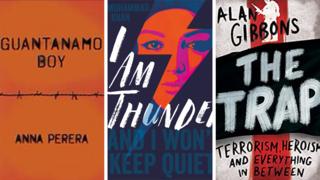
Anna Perera, Muhammad Khan, Alan Gibbons
Some of the books analysed in the research
A girl being groomed to become a suicide bomber might not sound like the most child-friendly novel.
But fiction books about terrorism and radicalisation have been helping children and young adults “resist extremism and Islamophobia” since the 9/11 terror attacks, new research suggests.
Nearly 3,000 people were killed and thousands more injured on 11 September 2001. The following month, US forces launched military action in Afghanistan and the “War on Terror” began.
A consequence of that, according to Cambridge University’s Dr Blanka Grzegorczyk, was Muslim and immigrant communities being “presented by the media as posing a threat to the core of British culture, nationhood and identity”.
British authors have been “writing back” against that portrayal, suggests her Cambridge study – the first to examine the wave of books commissioned after 9/11 and 7/7 by children’s publishers that deal with those themes.
‘Reading dispelled so many myths’
Dr Grzegorczyk looked at 28 books published since 2001, like one by Noughts and Crosses author Malorie Blackman.
Many of the books “depict the ramped-up security measures adopted by the British state”, Dr Grzegorczyk says, that “in tandem with the media’s cultivation of a certain paranoia” helped promote a “constant fear” of Muslims.
She says books like Run, Riot by Nikesh Shukla – about a group of teenagers pursued by the police after one of them films the politically-sanctioned murder of an ethnic minority youth – “communicate across the tribal divide that young people have grown up with”.
“They are offering young audiences a counter-narrative to that anti-Muslim and anti-immigrant rhetoric,” Dr Grzegorczyk tells Radio 1 Newsbeat.
Muhammad Khan’s I Am Thunder – about a British Asian girl whose marginalisation leaves her vulnerable to radicalisation – also featured in the study.
“The way we often talk about those things in the media and our everyday lives feels quite simplistic,” says Reuben Thomas.
Reading I Am Thunder gave the 27-year-old a different perspective on radicalisation and Islam, he says.
The portrayal of the main character suggests there are various factors – such as prejudice and bullying – that can lead to someone being radicalised.
“This book does a really good job of showing the nuance and complexity, without it being a victim narrative.”
Image copyright
Reuben Thomas
Reuben feels there is a tendency to “other” people who do not come from the same background as us
Reuben says he has a clearer understanding of “the insidious nature of radicalisation” because the book “humanised the people involved and encouraged some empathy”.
He says there are “horrendous narratives” in the media about young people being in gangs and religion being a negative thing – particularly for Muslims and British Asians – but the book “dispelled so many of the myths”.
“It stripped all that away and looked at people as individuals, focusing on similarities rather than differences.”
You might also be interested in:
These books feature characters who form bonds beyond racial, cultural, religious or national divides. The study suggests this can help readers imagine a future based on shared values.
Siobhan Dunlop agrees.
The 27-year-old says the ethnic minority characters in Run, Riot are shown to be individuals “with hopes and dreams”.
“They are shown as human and presented in a way closer to reality.”
She says fiction can help deal with issues like Islamophobia because you get to see details from people’s lives “and realise they’re connected to you”.
Image copyright
Siobhan Dunlop
Siobhan says she has learned through the themes around police brutality, class and immigration
“They love their family, might have a similar taste in music or have visited similar places. I think that can help people connect in different ways with issues.”
Siobhan’s also started questioning the “narrative around gentrification making things better” since reading the book. Gentrification is when areas change as richer businesses and people begin moving in.
“It’s particularly poorer ethnic minority groups who get impacted by this kind of politics,” she says.
“And for me it challenges the idea that having these new things is always progress – when actually it’s disturbing people’s way of life.”
Inspiring activism
The books in the study, and others like them, are inspiring “a new wave of youth activism”, Dr Grzegorczyk says, pointing to Black Lives Matter, Fridays for Future, and US campaigns against gun violence.
“These books are pointing them towards a new kind of connectedness across cultures that moves us on from previous generations’ fixation with ‘us against them’.”
Siobhan says books have changed her political views and “make me want to act on those ideals”.
“They give you a different way of looking at the world.”
Follow Newsbeat on Instagram, Facebook, Twitter and YouTube.
Listen to Newsbeat live at 12:45 and 17:45 weekdays – or listen back here.